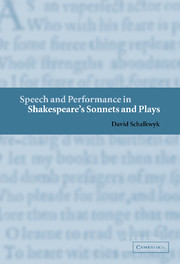Book contents
- Frontmatter
- Contents
- Acknowledgements
- Introduction: the sonnets
- 1 Performatives: the sonnets, Antony and Cleopatra and As You Like It
- 2 Embodiment: the sonnets, Love's Labour's Lost, Romeo and Juliet and Twelfth Night
- 3 Interiority: the sonnets, Hamlet and King Lear
- 4 Names: the sonnets, Romeo and Juliet, Troilus and Cressida and Othello
- 5 Transformations: the sonnets and All's Well that Ends Well
- Conclusion
- Bibliography
- Index
5 - Transformations: the sonnets and All's Well that Ends Well
Published online by Cambridge University Press: 22 September 2009
- Frontmatter
- Contents
- Acknowledgements
- Introduction: the sonnets
- 1 Performatives: the sonnets, Antony and Cleopatra and As You Like It
- 2 Embodiment: the sonnets, Love's Labour's Lost, Romeo and Juliet and Twelfth Night
- 3 Interiority: the sonnets, Hamlet and King Lear
- 4 Names: the sonnets, Romeo and Juliet, Troilus and Cressida and Othello
- 5 Transformations: the sonnets and All's Well that Ends Well
- Conclusion
- Bibliography
- Index
Summary
In the previous chapter I traced the ways in which a name may act as more than a mere designator in the worlds of Shakespeare's plays and sonnets. From its action as a focal point of ineradicable social relations and ties in Romeo and Juliet and the sonnets, through its idealising and de-idealising use in Troilus and Cressida and the dark-woman poems, to its transformative power in the naming and re-naming events of Othello, I have argued that the proper name may be as much part of the performative dimensions of language use as more syntactically elaborate utterances. In this chapter I pursue the question of names as one thread within the broader text of All's Well that Ends Well and its much noted relationship to Shakespeare's sonnets. Helen's predicament represents the limits of what names can do. Being merely ‘the name and not the thing’ (All's Well, 5.3.310), she has to seek performative modes of action beyond language that can transform her from ‘name’ to ‘thing’. The framing analysis for the role of names in All's Well includes an extended re-examination of the much noted affinities between the play and the sonnets, the politics of gender and class in the play and the poems, and the subject positions and embodied situations of address of the sonnets that are represented within in the play.
- Type
- Chapter
- Information
- Speech and Performance in Shakespeare's Sonnets and Plays , pp. 198 - 237Publisher: Cambridge University PressPrint publication year: 2002
- 1
- Cited by



